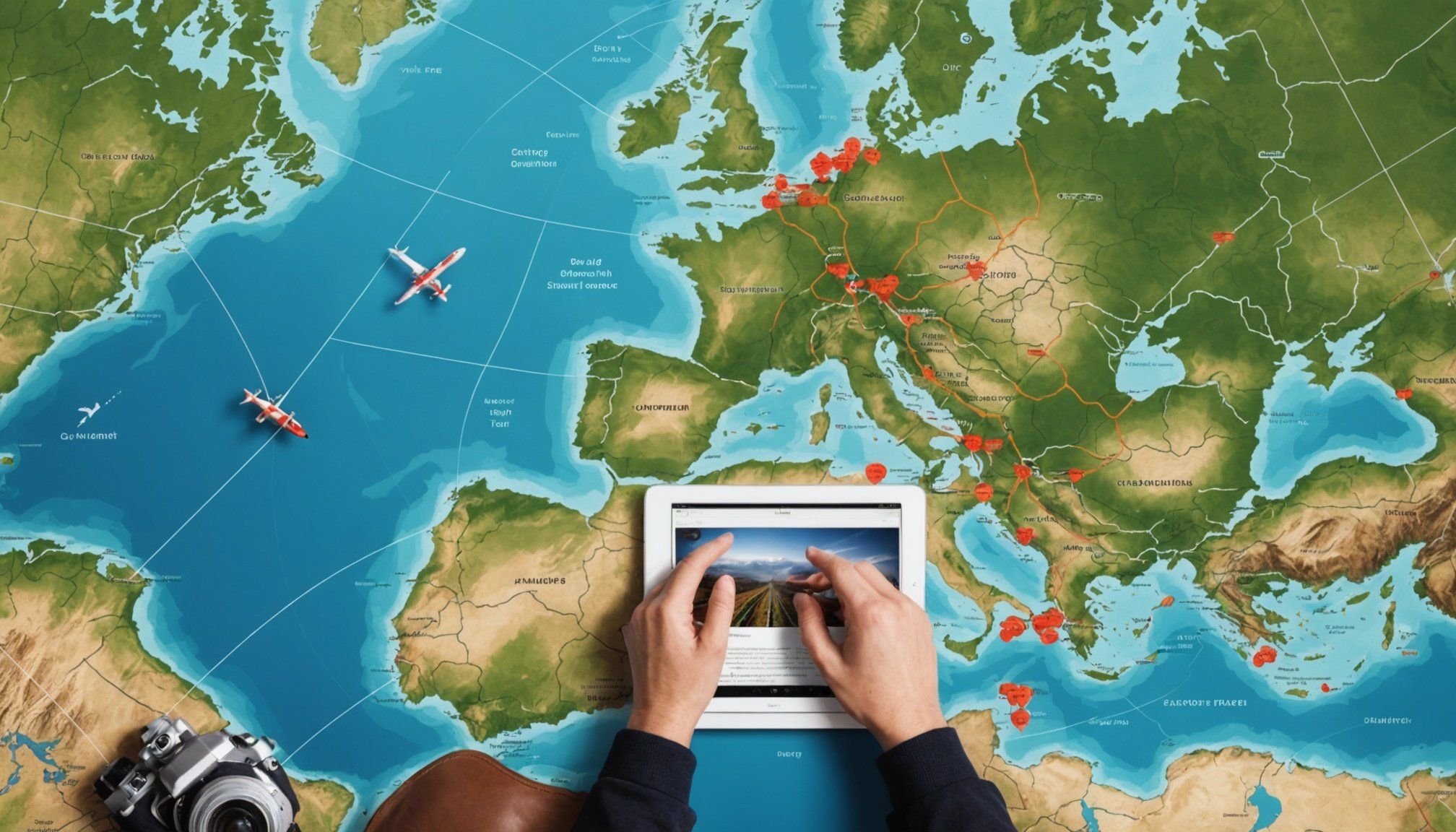Importance of Geolocation Data in Travel
Geolocation data is a pivotal element in modern travel, offering insights into where travelers are located and how they move. This data plays a crucial role in enhancing travel personalization, allowing companies to tailor services to individual needs and preferences. By leveraging geolocation data, businesses can significantly improve the customer experience, making it more engaging and relevant.
Geolocation data helps companies understand traveler patterns and preferences, aiding customer decision-making. When travelers have access to personalized offers, such as nearby attractions or dining recommendations, they are more likely to make spontaneous decisions that enhance their travel experiences. Moreover, having real-time location information allows businesses to provide timely and pertinent offers, increasing both satisfaction and loyalty.
Topic to read : Transforming marketing results: harnessing ai for enhanced campaign success in uk agencies
Recent statistics reveal that a considerable percentage of travelers prefer personalized experiences. Travelers appreciate when services are customized based on their current location and past behaviors, illustrating geolocation data’s impact on preference. For instance, according to a survey, over 80% of travelers expressed a desire for more tailored experiences based on their geolocation.
By harnessing the power of geolocation data, travel companies can ensure more personalized journeys, ultimately enriching the overall customer experience and adapting their offerings to meet evolving demands.
Also to discover : Transforming marketing results: harnessing ai for enhanced campaign success in uk agencies
Benefits of Using Geolocation Data for Travelers
Travel has evolved immensely, thanks to geolocation data, which has revolutionized how travelers plan and enjoy their journeys. This technology facilitates personalized travel experiences, greatly enhancing trip planning by offering location-based recommendations. Imagine a platform suggesting hidden gems or local events nearby, tailored to individual preferences. This level of customization turns an ordinary trip into a memorable adventure, ensuring maximum customer satisfaction.
Furthermore, geolocation data contributes to increased satisfaction by providing real-time updates. Whether it’s receiving alerts about delayed flights or rerouting around traffic blockages, these timely notifications significantly improve travel convenience and safety. Such proactive updates not only save time but also reduce travel-related stress, allowing travelers to focus on enjoying their destinations.
Incorporating geolocation data enables travel platforms to offer seamless experiences. This approach emphasizes user convenience, providing travelers with comprehensive insights and solutions tailored precisely to their needs. As a result, travelers can effortlessly navigate new locales and delve into personalized itineraries crafted from their preferences. In today’s fast-paced world, this blend of technology and travel creates a harmonious synergy, making journeys not only efficient but truly enriching.
Case Studies from UK Travel Agencies
Exploring UK travel agencies reveals innovative applications of geolocation technology that have transformed customer experiences. Each agency’s unique approach highlights the technology’s potential and benefits.
Case Study Overview of Agency A
Agency A seamlessly integrated geolocation technology into its booking process. By personalising travel itineraries based on customers’ current location, they improved satisfaction and convenience. Real-time updates allowed customers to adjust plans effortlessly, enhancing their travel experience. This approach resulted in a significant 20% boost in client subscriptions and repeat bookings.
Case Study Overview of Agency B
Agency B utilised geolocation data to optimise marketing strategies. They targeted advertisements based on travellers’ geographic locations, tailoring special offers and promotions to increase engagement. This led to a 30% higher conversion rate compared to traditional methods. By understanding customer preferences, Agency B cultivated loyal relationships and expanded their market presence successfully.
Case Study Overview of Agency C
Agency C focused on enhancing destination recommendations through geolocation technology. They provided curated experiences aligned with the traveller’s location and interests, offering insights like local events and eateries. This tailored approach not only enriched the travel experience but also boosted user ratings by 25%, proving the effectiveness of geolocation data in delivering customised content.
Integrating Technology with Geolocation Data
Technology integration in travel has seen significant advancements, especially with mobile applications and data analytics playing pivotal roles. Mobile applications are leading the charge by offering seamless travel experiences. They utilise geolocation data to provide real-time navigation and updates, ensuring travellers are always informed about their surroundings and potential destinations. These apps can optimise routes, suggest points of interest, and even predict traffic patterns based on current geolocation data.
Harnessing the power of data analytics, technology tools are designed to transform raw geolocation information into actionable insights. For instance, when a traveller inputs a destination, data analytics can suggest the quickest and most efficient travel routes. Furthermore, predictive analytics can anticipate user preferences, offering personalised suggestions to enhance the travel experience.
Travel services benefit immensely by using geolocation data to optimise their operations. By analysing patterns in traveller behaviour and preferences, service providers can tailor their offerings to better meet customer demands. This can include prioritising popular attractions, improving scheduling efficiencies, or adjusting services in real-time based on current location data trends.
These innovations make travel more accessible and efficient, showcasing the immense potential of integrating technology with geolocation data.
Tips for Implementing Geolocation Strategies
Implementation strategies for geolocation are integral to enhancing operational efficiency in travel agencies. Adopting best practices begins with collecting precise geolocation data. Agencies can deploy apps using GPS technology to obtain real-time location insights. This allows for personalised recommendations, improving customer experiences.
Creating user-friendly experiences is crucial. Integrate geolocation with a simple interface to enable easy understanding. Consider interactive maps that highlight points of interest based on a traveller’s current location. Such tools not only engage users but also encourage repeat business through simplified navigation and exploration.
The importance of staff training cannot be underestimated. Ensure thorough sessions on the use and benefits of geolocation technology. Educated employees can seamlessly guide customers, optimising the technology’s application to meet client needs effectively. Training should include data privacy awareness, as customers increasingly value their information’s security.
To amplify operational efficiency, maintain regular updates of applications to avoid glitches and improve geolocation accuracy. As travel agencies evolve, so must their strategies to stay competitive in an increasingly tech-savvy market. With well-implemented strategies and constant refinement, geolocation technology can be a powerful tool for any travel-centric business.
Challenges and Considerations
Navigating the landscape of modern travel involves more than booking tickets and packing bags. Challenges in travel include the intricate task of collecting and processing geolocation data. This task, though crucial for enhancing customer experience and operational efficiency, poses significant complexities. Data must be accurate and timely, making real-time processing a technological endeavour.
Data privacy is another major concern. Travellers expect their information, such as personal identity and travel itineraries, to be safeguarded. The risk of breaches affects customer trust deeply, and once compromised, it can take immense effort to rebuild. Thus, ensuring robust data protection systems and transparent privacy policies are essential for maintaining customer confidence.
Moreover, travel agencies face regulatory compliance hurdles. Different regions enforce varied and often stringent regulations regarding data handling and privacy. Agencies must stay informed and adapt to ensure full compliance, avoiding potential legal consequences and financial penalties.
While these challenges in travel present hurdles, addressing them with diligence and foresight can contribute to creating secure and enjoyable experiences for all travellers. Agencies that strategically manage these aspects are likely to foster greater customer loyalty and operational success.











